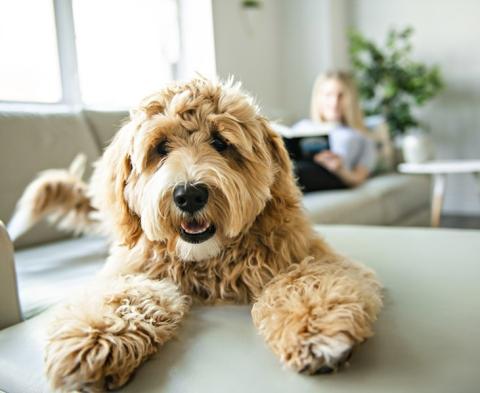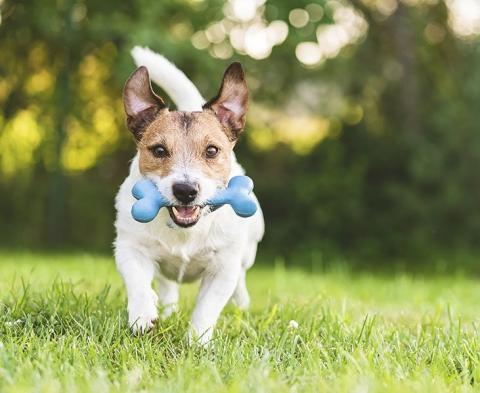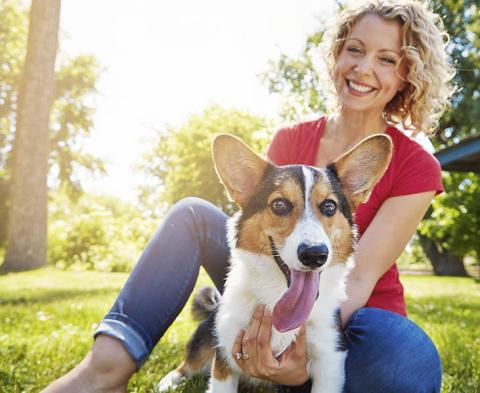Bringing a Puppy Home
When it comes to knowing how to look after a puppy, there are ways that you can keep yourself on track. Creating your own ‘preparing for a puppy checklist’ is an effective way to make sure that you have everything you need.
In fact, before your new pup even enters your home, there are several puppy ‘must haves’ that will help them adjust to their new environment. This list can include everything from a food bowl and a collar and lead, to puppy-proofing your house so that it a safe, comfortable space for your puppy to grow.
Puppy Health
From the moment your new dog arrives at your home, knowing how to look after a puppy in relation to its health is paramount. For example, having the appropriate puppy vaccinations at the right times is essential to protect your dog against a number of important infectious diseases. Vaccination against some diseases (e.g. canine parvovirus) is necessary for all dogs, regardless of their lifestyle. Kennel cough vaccination is also usually part of the standard vaccination protocol for puppies. Kennel cough (also known as canine cough) is a highly contagious respiratory disease which can be easily spread wherever dogs congregate, not just in boarding kennels.
Another important part of puppy care is parasite control. There are several important parasites that can affect dogs, and some are also a risk to humans. Fleas on dogs are important parasites, as are dog mites, ticks, and intestinal worms. Heartworm in dogs is another potentially serious parasite you need to protect your puppy against. NexGard SPECTRA® makes parasite protection easy, with flea, tick, mite, heartworm and intestinal worm protection in one monthly treatment.
Desexing your puppy can reduce the risk of some serious health conditions later in life and will prevent litters of unwanted puppies. Your vet can advise you on the best time to desex your puppy.
It is important to watch out for signs of puppy sickness such as vomiting and lethargy and contact your vet if you have any concerns.
Puppy Grooming
Grooming is an important part of puppy care. It is vital that you begin conditioning your puppy to being groomed right from the start. Go slowly and use lots of treats and praise to ensure your puppy forms a strong positive association with the grooming experience. This includes not only brushing, but bathing, nail and dental care.
One of the simplest things to do to keep your puppy neat and clean is brushing. A bath may also be required to keep your puppy clean but be careful not to overdo this to avoid removing the natural oils that keep their coat healthy.
Puppy nail clipping is also important, as long nails can affect their ability to walk and can result in pain or infection if they break at the base of the nail. Trimming their nails at this early stage will help in the long term, as your puppy becomes used to the grooming process. Your veterinary clinic can provide you with tips to ensure you don’t trim the nails too short.
Some people may consider their puppies to be too young to need dental care, but it is crucial to establish regular cleaning routines early. Whether you use a dog appropriate toothpaste and brush, or specially designed chew toys to help clean their teeth, it is important to get your puppy used to this process when they are young. Your vet can provide the most appropriate advice on caring for your puppies teeth.
Puppy Socialising
An important part of responsible puppy care involves introducing your pup to new people, animals, places, sounds, smells and textures. Puppy socialising is a crucial part of any dog’s development as this will greatly contribute to the type of adult dog that they will become. This process needs to be approached in a safe, positive way so that your puppy can feel secure and comfortable as they learn to relate and interact well with other dogs, animals, and people.
Knowing how to look after a puppy when they are around others or in new environments is an important skill to master. It is important that you don’t take your puppy to environments where they may be exposed to infectious diseases (such as dog parks) until they are fully vaccinated. However, a simple way to introduce your puppy to others is to have the dogs and puppies of your friends and family visit either at your house or their house. Before you begin arranging social interactions for your puppy, make sure that any dogs they encounter are fully vaccinated. You should also ensure that any dog you allow your puppy to interact with is social and enjoys the company of other dogs so that the meeting is a positive experience for both individuals. While it is important for your puppy to learn how to appropriately interact with other dogs, it is just as important for them to learn to be calm around them and ignore them when required. A qualified force-free trainer can assist with this.
FAQs
-
How to Take Care of Newborn Puppies Without a Mother
Knowing how to look after a puppy without a mother is a challenge, as puppies rely solely on milk for sustenance during the first few weeks of their life. Fortunately, you can give your puppy all the nutrition that it needs with a puppy milk replacer. Speak to your vet for further advice on this. You can then offer affection and security through the routines and interactions that take place every day to build a strong bond.
-
How to Take Care of a Puppy When You Work
When you work outside of the home environment, puppy care can prove difficult. Putting measures in place can go a long way to help look after a puppy, including returning home on your breaks, asking a friend or neighbour to check in throughout the day or employing a puppy sitter. Establishing consistent routines will help your puppy adjust to the times when you are away as they will be able to anticipate your return and adapt to the situations presented to them. Whatever works best for you and your family will contribute to your puppy’s wellbeing.
It is best to leave your puppy with interesting things to do when they are home alone. Providing your puppy with enrichment will ensure that they are mentally stimulated and help to budget their time so that they spend as much time as possible engaged in positive activities. Creating a ‘treasure hunt’ by hiding pieces of their kibble all over is one exciting game for your puppy. Interactive food toys and novel things to chew and smell are also ideal.
-
Mange Treatment for Puppies
Infestation with mites can cause severe irritation to the skin and ears of dogs. This condition, known as mange, can significantly impact your dog’s quality of life. There are three different types of mites that affect dogs: ear mites, Demodex mites and Sarcoptes mites. Ear mites are common in puppies. Simple, monthly dosing of NexGard SPECTRA helps keep your dog healthy by treating and controlling mites.
CAN-0072-2022
Related Articles






Copyright and Trademark Notice
NEXGARD SPECTRA®, NEXGARD®, HEARTGARD30® and PARAGARD® are registered trademarks of the Boehringer Ingelheim Group.
©2021-2022 Boehringer Ingelheim Animal Health Australia Pty. Ltd. All rights reserved. PET-0228-2022